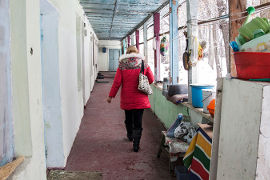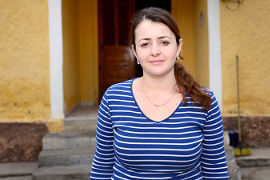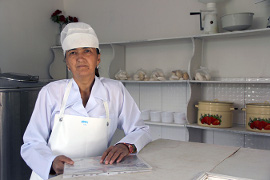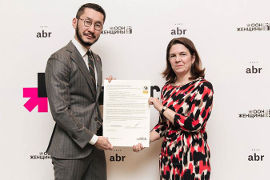SDG 8: Promote sustained, inclusive and sustainable economic growth, full and productive employment and decent work for all
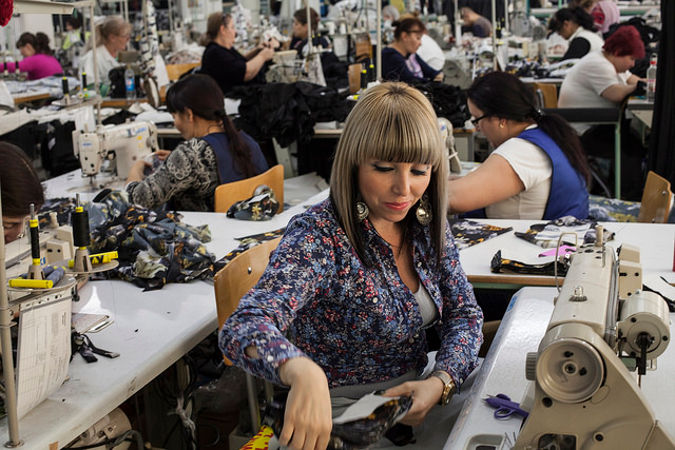
Targets
- By 2030, achieve full and productive employment and decent work for all women and men, including for young people and persons with disabilities, and equal pay for work of equal value.
- Protect labour rights and promote safe and secure working environments for all workers, including migrant workers, in particular women migrants, and those in precarious employment.
- Take immediate and effective measures to eradicate forced labour, end modern slavery and human trafficking and secure the prohibition and elimination of the worst forms of child labour, including recruitment and use of child soldiers, and by 2025 end child labour in all its forms.
- Sustain per capita economic growth in accordance with national circumstances and, in particular, at least 7 per cent gross domestic product growth per annum in the least developed countries.
- Achieve higher levels of economic productivity through diversification, technological upgrading and innovation, including through a focus on high-value-added and labour-intensive sectors.
- Promote development-oriented policies that support productive activities, decent job creation, entrepreneurship, creativity and innovation, and encourage the formalization and growth of micro-, small- and medium-sized enterprises, including through access to financial services.
- Improve progressively, through 2030, global resource efficiency in consumption and production and endeavour to decouple economic growth from environmental degradation, in accordance with the 10-year framework of programmes on sustainable consumption and production, with developed countries taking the lead.
- By 2020, substantially reduce the proportion of youth not in employment, education or training.
- By 2030, devise and implement policies to promote sustainable tourism that creates jobs and promotes local culture and products.
- Strengthen the capacity of domestic financial institutions to encourage and expand access to banking, insurance and financial services for all.
- Increase Aid for Trade support for developing countries, in particular least developed countries, including through the Enhanced Integrated Framework for Trade-Related Technical Assistance to Least Developed Countries.
- By 2020, develop and operationalize a global strategy for youth employment and implement the Global Jobs Pact of the International Labour Organization.
Economic growth contributes to sustainable development where it extends benefits to all people, actively reduces inequalities and avoids harm to the environment.
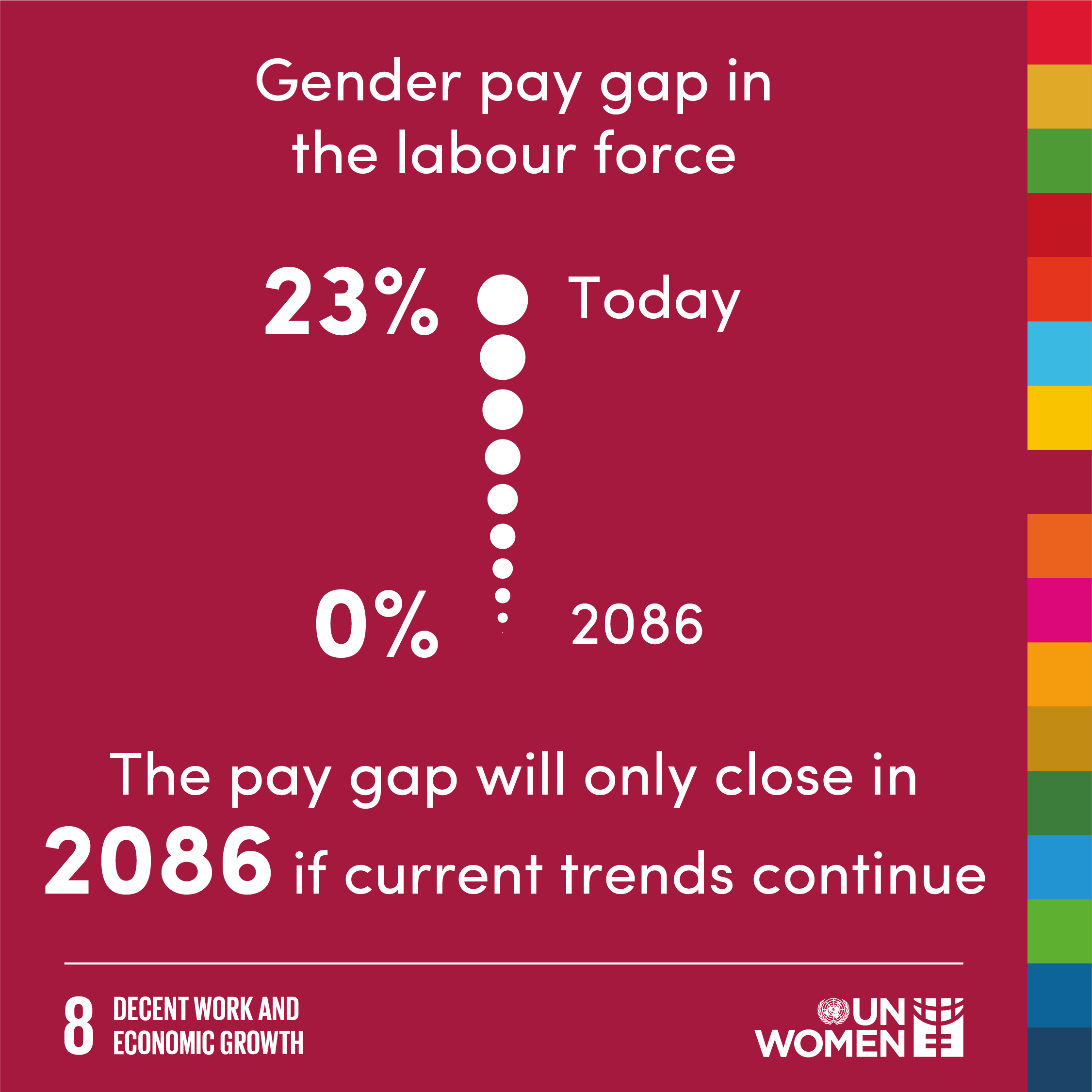
For growth to be inclusive, it must be decent work equally accessible to women and men. With women still less likely to participate in the labour force, and more likely to take the worst jobs in it—insecure, unsafe and poorly paid jobs—inclusive growth remains far out of reach.
Globally, only 63 per cent of women aged 25 to 54 are in the labour force compared to 94 per cent of men of the same age. Women’s participation rate has barely budged in the last 20 years, except in Latin America and the Caribbean, where it rose from 57 per cent to 68 per cent. In Central and Southern Asia, the rate has fallen to 37 per cent. Kyrgyzstan is one of the countries in the region recording the largest declines since 1997 with 14.7 percentage points.
At current rates of change, the gender gap, which stands at 23 per cent globally, will not close until 2086—or possibly beyond. The estimation only considers better formal jobs, and not the informal, poorer quality ones where many women still work. Patterns of occupational segregation mean some occupations remain dominated by men or women, with the latter tending to be lower in status and pay.
UN Women acts to achieve economic rights and growth for all by promoting decent work, equal pay for equal work, equal access to economic assets and opportunities, and the fair distribution of unpaid care work. Specific support for informal workers helps them claim their rights and have a voice, including through trade unions. Partnership with the private sector, including through the Women’s Empowerment Principles, helps transform business practices in support of gender equality and women’s empowerment.
Stories
In the words of: "We were sex slaves"
Originally from Tashkent, Uzbekistan, Luiza Karimova* left her son with her family and travelled to Osh, Kyrgyzstan to find work. In Kyrgyzstan, she was sold into sex slavery and trafficked into Dubai. After 18 months, she was arrested and sent to jail. Today, Karimova works with Podruga, an organization based in Osh, Kyrgyzstan, which is supported by UN Women. Podruga works to end violence against women and assists women subjected to sex and drug trafficking.
From where I stand: “I set up a tourist guest house to support my family”
Saudita Marku, a city girl, looked for new income opportunities to support her family when after marriage she moved to rural village in Albania. She received training from UN Women on how to formalize her business, apply for financial incentives, and develop marketing and business plans. She now runs a guest house for tourists, and also a bee-keeping business.
In the words of Aisulu Jenalieva: “Women can have more freedom and men can share domestic work”
Aisulu Jenalieva, 48, has gone from being an abandoned wife of a migrant worker without the means to support her family, to leading a self-help group and collective that runs Jirgatol district’s first dairy production facility in north-east Tajikistan. She received technical knowledge and business support from UN Women.
Take five: “Managing a company is about managing talents, there’s no place for discrimination”
Askar Baitassov, Chief Executive Officer of Kazakhstan’s AB Restaurants chain, talks about why the company champions gender equality. AB Restaurants is the first company in Central Asia to sign on to the Women’s Empowerment Principles (WEPs), a joint initiative of UN Women and the UN Global Compact, which places gender equality at the heart of good business practices. Mr. Baitassov has also joined UN Women’s HeforShe campaign.
